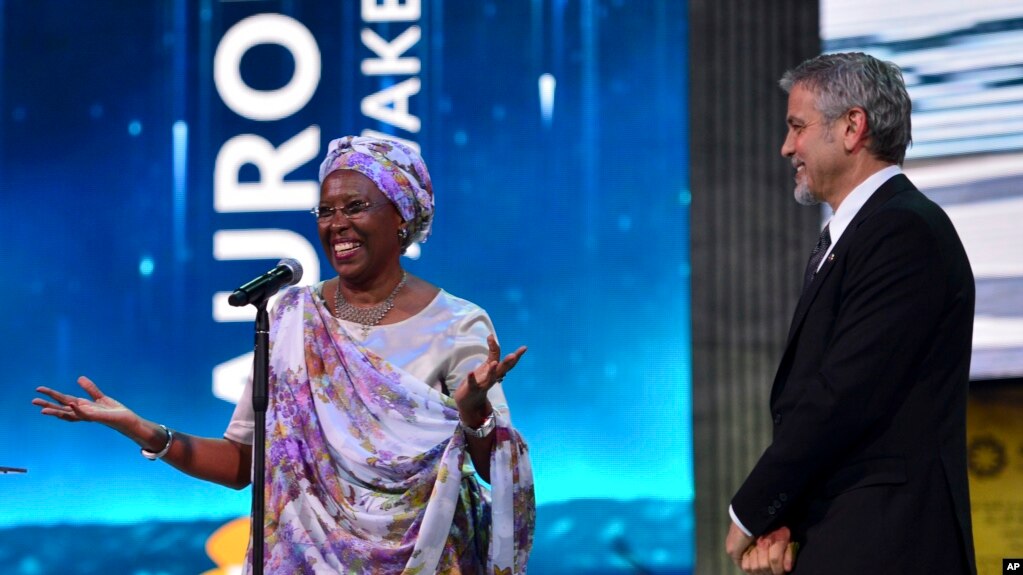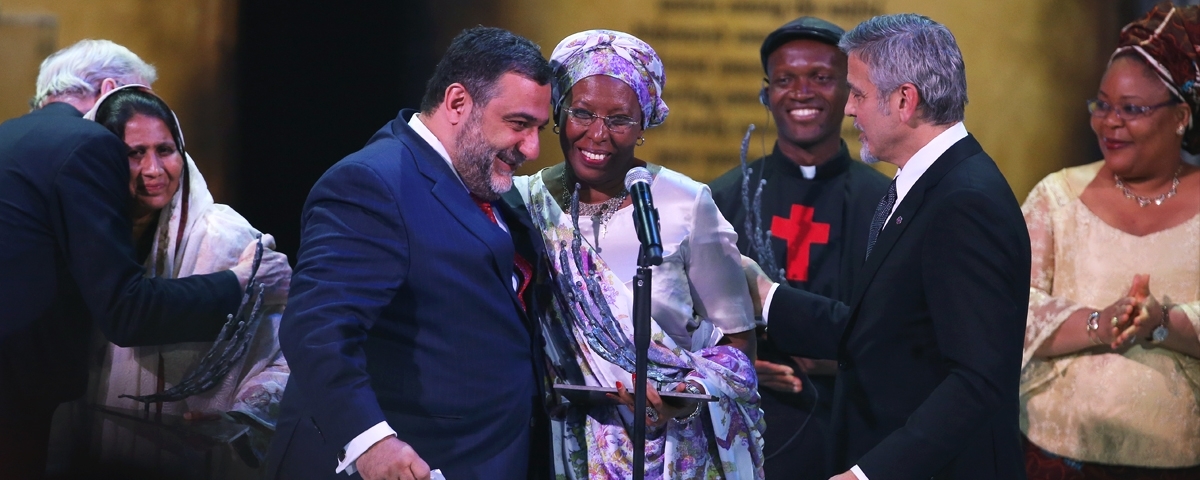
She says people call her ‘crazy’ but she’d rather be crazy than be a killer.
When she said she was going to adopt 20,000 children she was called insane.
When asked what is her strategy to fight the militants and the corrupt leaders – she says her weapon is love, she will fight with love.
When she went to visit criminals in the Burundi prison she was once again called crazy.
She said ‘If Someone shows them love their lives could be changed.’
She’s a woman who is making a difference in the world simply by showing love to others.
Her name is Marguerite Barankitse and ‘no’ she is not crazy.
Some call her the angle of ‘Burundi,’ ‘The national mother,’ or ‘Saint Maggy.’
Few people have been as selfless and dedicated to fighting injustice and crimes towards humanity as this woman has been.
Her contagious energy and passion for life is amazing even after all the ‘bloodiness’ she has been put through.
She is this week’s Extraordinary Woman and this is her story:

Marguerite Barankitse is the founder of Maison Shalom, a complex of schools, hospitals, and a network of care extending throughout Burundi, and has focused on children’s welfare and rights while challenging ethnic discrimination.
Marguerite grew up in a war torn Burundi where people were killed either because they were born into one tribe or the other.
Marguerite asked her mother when she was little why people were being killed or discriminated against because of their tribe and her mother told her that it was because they were not educated.
So Marguerite decided to become a teacher later in her life so that she could educated young children and fill their minds with positive values.
After studying administration in Switzerland in the late 1980s, Maggy returned to Ruyigi and was hired by the diocese as a secretary, a post she held until the events of 24 October 1993.
Unfortunately for Marguerite, her plans didn’t go as smoothly as she’d thought they would.
During the war in Burundi, her entire family and friends were wiped out by militants and at a point she had to ask herself if she wanted to live or if she wanted to die in this country. She herself had become a target and the militants wanted her dead.
That was the point at which she decided to flee from Burundi.

Before the war, and before becoming exiled from Burundi, Marguerite adopted several children of different tribes even though she wasn’t married.
People told her that she was crazy – but she wasn’t. She had a vision and she intended to fulfil it by all means possible.
All Marguerite was determined to do was to help the homeless children, show them love and give them a chance to grow up to be children with a good education and life to look forward to.
She cared for the children as if they were members of her family, regardless of their ethnic origins.
Marguerite began providing food and shelter to 25 children on October 25, 1993, one of the worst days of the Burundi Civil War. She saw many people brutally killed before her very own eyes.
She was stripped naked, tied to a chair and was forced to watch the slaughter by the Tutsie militants who called her a betrayer for trying to hide the Hutu’s that were found hiding in the church.
Marguerite begged the militants not to kill the children and she bribed them with 11,000 dollars that she had kept.
After the slaughter she gathered the 25 orphaned children so she could help them. With the help of European and Burundian friends she organized a help network that managed to provide care for not only the growing number of children, but former child soldiers, Aids orphans, prostitutes, and any young person that needed help. In May 1994 the Roman Catholic Bishop of Ruyigi, Bishop Joseph Nduhirubusa agreed to transform a former school into a children’s shelter called ‘Maison Shalom’ – House of peace.
Marguerite even opened up a theatre for the children.
People asked her why when some people had no food to eat was she opening up a theatre of all things and she said it’s because she wants to give them a good quality life and not just food on their plates.

Her activities expanded to other cities such as Butezi and Gizuru where she opened other children’s shelters.
The various centres continued to fill, prompting Maggy to consider the sustainability of her “houses of peace”. She knew that nothing could ever replace the warmth and stability of a family in a child’s development. Although the war continued unabated, Maison Shalom maintained its efforts to trace the origins of the children it had taken in. The aim was to find their families.
Those initial efforts paid off some time later, in the late 1990s, when Maison Shalom launched its first efforts at reintegration.
Everything was done, no stone was left unturned, to promote the children’s return to their communities of origin. Sometimes Maison Shalom even sought out the neighbours of families, and asked them to take care of the land the children would inherit until they returned. To that end, Maison Shalom sometimes provided the neighbours with financial support, enabling them to buy the seeds and tools needed to plant and work the land. This was a visionary approach that promised land “back home” to those devastated by war.
In 1998 and 1999, many displaced people returned to their homes in several regions of Burundi. Maison Shalom took advantage of this development to use all the information it had collected on the children. In some cases it was able to reunite families. In 1999, for example, Maison Shalom returned 121 children who had sought refuge at one of its centres to their families (or communities), thanks to the support of Caritas Germany and UNICEF. It was unable to do this everywhere in Burundi, as certain regions remained prey to ongoing violence.
The programme of reintegration would expand as of 2000, after the signing of the peace accords.
In 2004 an estimated 20,000 children had benefited from her help, either directly or indirectly.

Funded by donations, by 2014 it had taken in more than 20,000 orphans, established schools, university courses and vocational training schemes, as well as 27 agricultural cooperatives in four provinces, and built more than 3,000 houses. Maison Shalom is staffed almost entirely by those who have grown up in its care.
A committed Catholic, Maggy has met successive popes and is also closely supported by the Grand Duchess of Luxembourg. She has been compared to Mandela and Mother Teresa, and over the years she has encountered numerous humanitarian luminaries, including the English actor Emma Thompson, who herself adopted a Rwandan refugee, and George Clooney, who awarded her the Aurora Prize at a ceremony in Armenia.

She rolls her eyes at the Mother Teresa mention and insists she is too hard-headed to be a saint. For that same reason, she says, she has never married and has no biological children. ‘Perhaps when I am 100 I will find a man kamikaze enough. I do not want to make someone suffer because I will forget him.
You must make choices in life. I chose to dedicate my life to all those children who had no hope.’
The scope of her action, as well as the fact that she protects all children without consideration of their origin, Tutsi or Hutu, brought her praise from all corners of the world
Marguerite’s awards include:
1998 : « prix des droits de l’homme » (Human Rights award) of the French government
2000 : North-South Prize from the Council of Europe
2003 : World’s Children’s Prize for the Rights of the Child
2004 : Voices of Courage Award of the Women’s Commission for Women and Refugee Children
2004 : Nansen Refugee Award
2008 : Opus Prize
2008 : UNESCO Prize
In June 2009, Grand Duchess Maria Teresa of Luxembourg, UNICEF Eminent Advocate for Children, visited Maison Shalom during a tour of Burundi. In October 2011, the Grand Duchess welcomed Marguerite Barankitse to Luxembourg to open a photographic exhibition in support of Maison Shalom.
On November 24, 2011, Marguerite Barankitse received the Prize for Conflict Prevention from the hands of Kofi Annan. The Conflict Prevention Prize is awarded every year by the Fondation Chirac, launched in 2008 by former French president Jacques Chirac.
On April 24, 2016 Marguerite was awarded the $1.1m Aurora Prize for Awakening Humanity, an award given to humanitarians in memory of the Armenian Genocide
Marguerite says that if all her acts of humanity are seen as crazy then she would like the entire world to join hands and join her in her madness.
Marguerite’s standing at home and abroad meant that she was initially feted by President Nkurunziza when he was elected in 2005, given a diplomatic passport and showered with civic titles. But when the crackdown on political opposition began, Maggy soon became an outspoken critic.
In 2015, after she denounced the president on television, death threats from militias loyal to the regime forced her to flee Burundi. After taking refuge in the Belgian consulate for a month, she disguised herself as a diplomat’s wife and flew to Luxembourg. In her absence, the government froze Maison Shalom’s accounts containing €949,022, and closed down its activities. Her staff decamped to Rwanda, followed by Maggy herself. She receives daily updates from Maison Shalom children imprisoned in Burundi.
Since setting up in Rwanda, the organisation has made education a priority, currently supporting 366 refugee students at Rwandan universities, most from Mahama camp, as well as hundreds of schoolchildren. Some of the youth are also being sent to France to study.
The aim, so Maguerite says, is to not let the brightest minds among the young and displaced go to waste; to ensure there are people left to rebuild Burundi when peace returns.
Since winning the $1 million Aurora Prize (she is ploughing every cent back into Maison Shalom and other charitable causes) Marguerite has used her profile to tell the world of the crisis in Burundi. Foreign journalists have long been expelled, but a UN report released in September found evidence of rapes, disappearances and mass arrests as well as the torture and murder of many thousands. The report warned that without urgent action, ‘a spiral of mass violence could bring conflict to the entire region.’
The UN’s second-ever day of genocide commemoration will take place on December 9, but as with the mass killings in Burundi and Rwanda 20 years ago, Marguerite says, the international community is looking the other way.
‘If we don’t pay attention, it will be like that again,’ she says. ‘It can happen tomorrow.’
In order to see more of what Marguerite Barankitse does or to make contributions to Maison Shalom – visit www.maisonshalom





